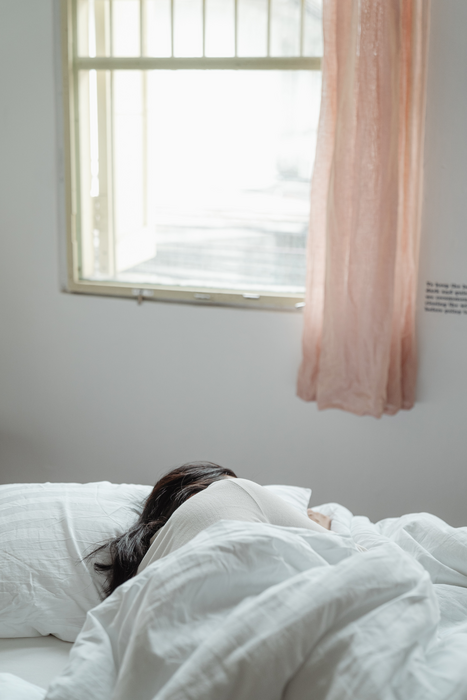Middle-aged women with low levels of estrogen and progesterone are more likely to snore and to report symptoms of obstructive sleep apnea, according to a new study published this week in the open-access journal PLOS ONE by Kai Triebner of University of Bergen, Norway, and colleagues.

Credit: Ketut Subiyanto, Pexels, CC0 (https://creativecommons.org/publicdomain/zero/1.0/)
Middle-aged women with low levels of estrogen and progesterone are more likely to snore and to report symptoms of obstructive sleep apnea, according to a new study published this week in the open-access journal PLOS ONE by Kai Triebner of University of Bergen, Norway, and colleagues.
The prevalence of obstructive sleep apnea—in which breathing stops and starts during sleep—is known to be higher in women after menopause. However no population-based study has previously examined whether this is the result of altered sex hormone levels.
In the new study, the researchers analyzed data from 774 women aged 40 to 67 in the European Community Respiratory Health Survey, conducted in seven countries between 2010 and 2012. Women in the study participated in questionnaires on their respiratory health, women’s health factors, lifestyle and sleep, and gave blood samples for hormone analysis.
551 of the women in the study (71.2%) had been told they snored, and 411 of those women also reported other symptoms of sleep apnea. Among all women, a doubling of serum concentrations of estrone was associated with 19% decreased odds of snoring. A doubling of progesterone levels was associated with 9% decreased odds of snoring. Among snorers, a doubling of the concentrations of three estrogens (17β-estradiol, estrone and estrone 3-sulfate) was associated with 17% to 23% decreased odds of women having been told they breathe irregularly during sleep. A doubling of progesterone concentration, among snorers, was associated with 12% decreased odds of having woken with a choking sensation in the previous year.
The authors conclude that adjusting female sex hormones might be a strategy to decrease the high prevalence and associated morbidity of obstructive sleep apnea, but say that further longitudinal studies are required to confirm the findings.
The authors add: “Female sex hormones are crucial for health and disease, and especially after menopause the hormone status should be considered to develop holistic treatment strategies.”
#####
In your coverage please use this URL to provide access to the freely available article in PLOS ONE: https://journals.plos.org/plosone/article?id=10.1371/journal.pone.0269569
Citation: Sigurðardóttir ES, Gislason T, Benediktsdottir B, Hustad S, Dadvand P, Demoly P, et al. (2022) Female sex hormones and symptoms of obstructive sleep apnea in European women of a population-based cohort. PLoS ONE 17(6): e0269569. https://doi.org/10.1371/journal.pone.0269569
Author Countries: Iceland, Norway, Spain, France, Sweden, Germany, Australia, U.K., Estonia
Funding: The work was funded by a postdoctoral scholarship from the University of Bergen. Recipient: Dr. Kai Triebner.
Journal
PLoS ONE
DOI
10.1371/journal.pone.0269569
Method of Research
Survey
Subject of Research
People
Article Title
Female sex hormones and symptoms of obstructive sleep apnea in European women of a population-based cohort
Article Publication Date
22-Jun-2022
COI Statement
The authors have declared that no competing interests exist.




